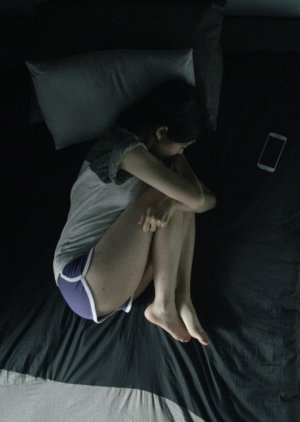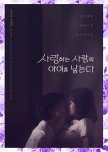
This review may contain spoilers
Ouch - in the best and worst ways.
After hearing that this film was soon to be taken off of GagaOOlala, I immediately put this at the top of my watchlist. And ultimately, I'm rather disappointed with it.It definitely spoke to a common asexual experience - with the main character starting to feel trapped in her relationship because of his frequent desire for intimacy. She'd even come up with reasons to get out of it (eating kimchi to get kimchi-breath, saying her sister is in town, etc.) and worried that her denial would upset her boyfriend. Asking her friend if she is supposed to like sex. Trying porn. Wondering if she might be homosexual and that's the reason for her lack of interest. The feeling of being numb and broken because she can't figure it out. These are experiences that many sex-repulsed and sex-indifferent asexuals can identify with. Perhaps even some sex-favorable aces.
And I loved the use of the S.O.S. Morse code whenever she's in a situation where she has to be "normal."
The film also used symbolism with the asexual flag colors (black, grey, white, and purple), but this felt a bit heavy-handed at times (it was everywhere, I'm not even kidding). But it did lead to a scene where someone commented on her always dressing like that and saying "it suits you" - which I found really cute. So I give it a tentative pass on that.
But at the same time, I don't think they used the colors with their meanings in mind - because we have a scene where she identifies everyone as being "black" - but yet black represents asexuality, so they probably should've used white instead.
Furthermore, at the end we get a scene where she seems to finally accept who she is. But then immediately afterwards we see her enter a crowd and cover her asexual-flag-colored dress with the quote saying "Everyone is black. And I am also black." The Morse code even stopped going off. I'm not gonna lie. This hurt. She had never once covered up her colors before, even when questioning. But now that she knows what she is, she's going to hide/ignore it. I've seen it in numerous other asexual short films, and it gets me every time. I hope we get to the point where this is another cliche ending we avoid.
And then there's the fact that asexuality is never once mentioned within the actual film.
I will say though that I appreciated the New York Times quote on asexuality at the end, as well as the Asexuality Visibility and Education Network (AVEN) resource. I think these are important for the topic being discussed.
Was this review helpful to you?






































